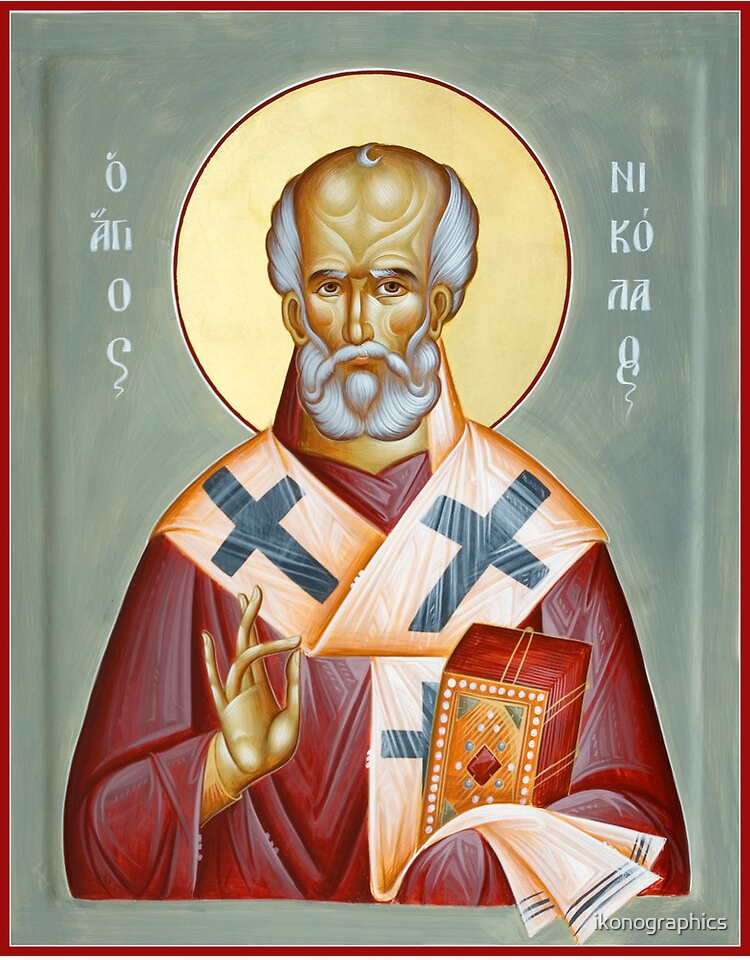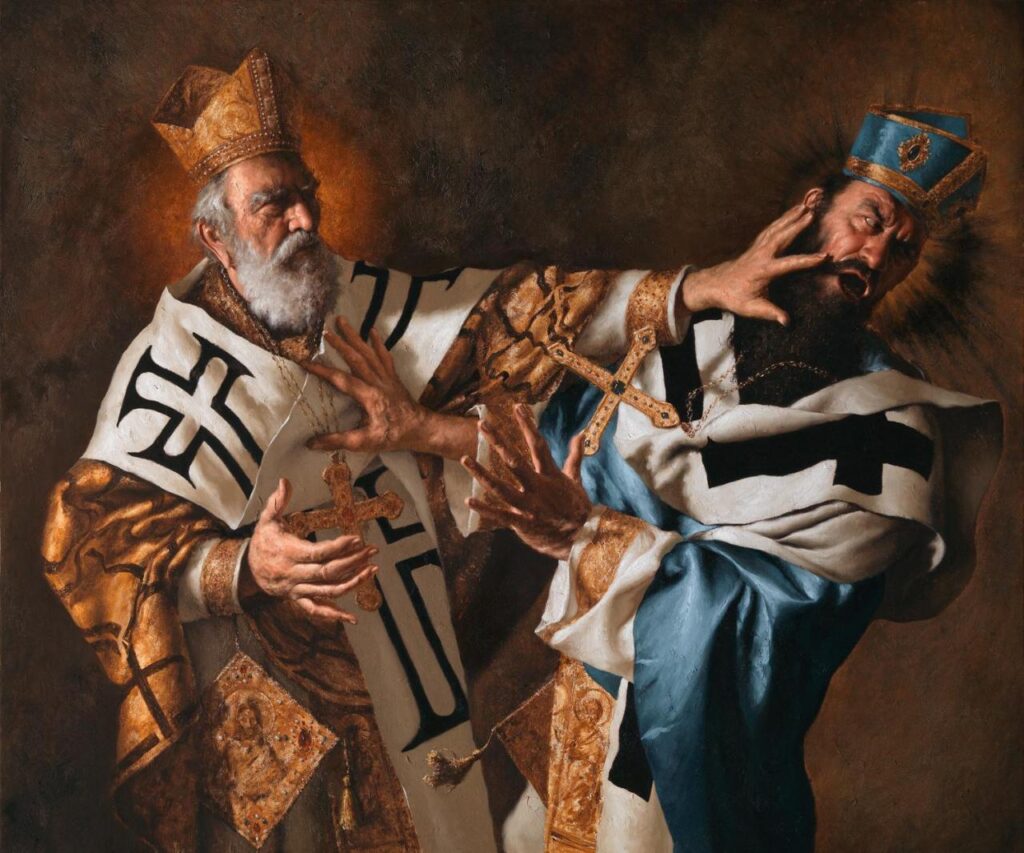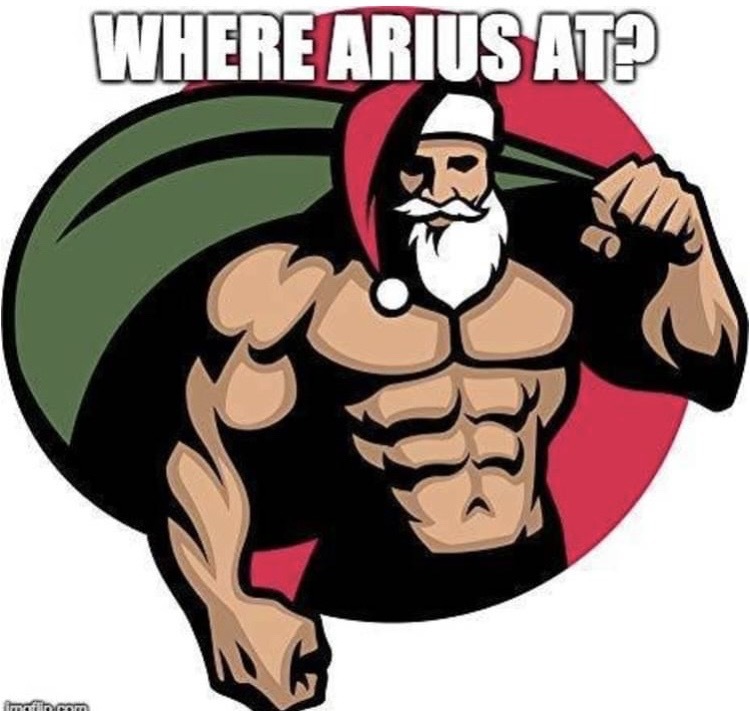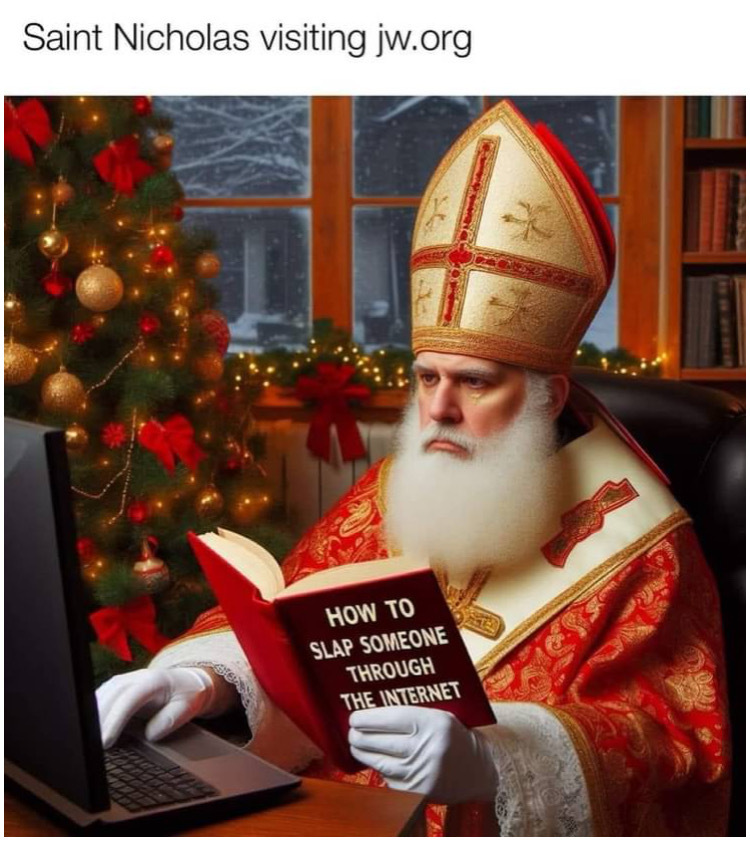In recent years, since converting to the Catholic faith, I’ve been more annoyed with “Santa” rituals and myths than before. I honestly think that the real loss of faith in many children can be traced back to Santa myths that their parents told them, which the kids believed in so deeply, until their parents either confessed the lie, or children learned it from a friend in school. And then the unfortunate association of Santa with the ChristMass holiday combines the disillusionment of a shattered belief in a fat bearded man with supernatural omnipresent and omnipotent abilities in general…well the attributes of God are just too close to Santa’s in a naïve child’s mind. When parents then try later to convince the children that God and Christ actually do exist, often half-heartedly because their own faith is weak and not well-practiced, those children smell a rat. The death of true faith is not far behind.
But recently it hit me – Santa Claus truly is real. I am such an idiot for not realizing this. And Santa’s reality has very real and great possibilities to bolster faith in God, for both lukewarm parents and their children.
Bishop Nicholas

Nicholas is a Christian bishop who lived on earth in the 3rd & 4th centuries, born in 270 in what is today Turkey, dying on 6 December 343. His feast day in the Catholic (and Orthodox + Coptic churches) is on December 6th (typically the day a saint died). The proximity of this important feast day with ChristMass, in the beginning of the Advent season, is why his legend has grown up in tandem with other ChristMass traditions. He is the patron saint of Russia, Greece, Albania, and others – and most importantly – he is the patron saint of Children.
Why is he the patron saint of children? Because of a legendary story – which the faithful have no reason to doubt – that he miraculously discerned that a local butcher of Myra, during a terrible famine in the city, lured three children into his shop, whence he butchered & pickled them for sale. Nicholas miraculously revived the children upon discovering this grave crime.
Nicholas’ most famous trait, however – his secretive gift-giving – comes from a great kindness he did for some young women in his diocese. Upon learning that a widowed & destitute father was planning on indenturing his three marriageable daughters into prostitution because he couldn’t afford a dowry for them, Nicholas secretively visited the house at night and tossed a bag of gold through the daughters’ 2nd story window. He repeated this same work of mercy the following two nights, being discovered by the girls’ father on the final night, after which Nicholas’ reputation for kindness and generosity grew.
But his greatest fame comes from his role in the Council of Nicea in 325. This great and epoch-making event was the first truly ecumenical council of Catholic bishops – derived from the Greek word oikoumene – meaning “from the whole world“. They had gathered in the Greek (now Turkish) city of Nicaea to settle the Arian dispute. This dispute centered on a core theological fact: was Jesus Christ:
- Just the Son of God (that is, a creature who had a beginning), or was
- He also God the Son, divine and co-eternal with the Father and the Holy Ghost?
Arius was the priest from Alexandria, Egypt who promoted the first view, while excluding the second. Arius and his faction were subtle, rationalistic, and imbued with the haughtiness of the great academies of the time. They played sophisticated word games, and were political in their leanings. They believed that the non-divinity of Christ was not only more sensical, but a better compromise with a Roman empire which only recently emerged from the last great Christian persecution, was still overwhelmingly pagan, and needed – so they believed – a softer, easier-to-swallow version of the Christian faith to maximize its political palatability. They believed that this “divinity” question was a non-essential one, and wished that these stubborn “divinists” would just get wise.
Their problem was: Arianism was false, and the worst heresy to hold, if Christ truly was divine.
And so – the council debated, and debated. St. Athanasius of Alexandria was the foremost “prosecutor” for the #2 view of Christ-as-Divine, but Bishop St. Nicholas was also present, and held an outsized influence at the council, due to his status as a confessor – one who had “confessed” the faith during the recent last persecution, and suffered for it (he had been imprisoned by Emperor Diocletian for refusing to renounce Christ).
Arius was apparently so insufferable and arrogant in his denial of the truth at this council that at some point St Nicholas, in a manly fit of holy outrage, hauled up and slapped him. Its the subject of many great works of art – and also of modern memes:



Keeping it Real
So you can see that Santa Claus – Bishop Saint Nicholas – is a real guy, who did real, “Santa-like” things in real life. He lived a burly, big-man existence on earth in a troubled time, but confessed a bold, unapologetic faith in Christ, at a time when this faith had just emerged from several uncertain centuries of persecution, and sporadic growth.
Note that above – and in my introductory paragraph – I used the present tense when naming St Nicholas. Although he lived on earth many centuries ago, he is a saint. And he is a Christian bishop. This is key. He is alive now. As CS Lewis famously said: “You don’t have a soul. You are a soul. You have a body“. We humans are of course composite beings – matter and spirit. And the spirit is eternal, no matter how corruptible and temporary is this interim flesh we inhabit. But all humans that are born and given an immortal soul by God exist now and forever, in the realest sense, whether on Earth or in Hell, Heaven, or Purgatory.
St. Nicholas is a saint, and a saint is a person who the church attests is in heaven presently, enjoying the beatific vision of God, effecting miracles on earth according to God’s good pleasure and the saint’s earnest petitioning. St. Nicholas’ remains are to this day housed in the Basilica_of_Saint_Nicholas in Bari, Italy. Every December 6th on his feast day, a strange, miraculous white liquid exudes from his relics, which are distributed throughout the world and account for numberless healings and other miracles.
So, Santa is real. He is even watching us, as all saints are apt to do. He is definitely watching you read this, since I prayed a short prayer to him directly before publishing this, asking his intercession with you specifically. Saints exist in heaven to intercede for our welfare, as the angels do. And what’s more, those among them who were ordained in the church – as deacons, priests or bishops – have on their souls the indelible mark of that ordination, just as we all who were baptized and confirmed, also retain those indelible marks on the soul. We cease being fathers/mothers, sons or daughters, business men, housewives, laborers. All we have in Heaven is 1) our sanctifying grace received from God, 2) our virtues we acquired during life on earth and 3) the indelible marks of the Church’s sacraments.
So St. Nicholas has great stature in Heaven right now.
Don’t Be Ridiculous
Does this sound like a fairy tale to you? Well, that’s your problem. Its all true.
Don’t imagine that this largely Godless age – with its fetish for social “progress”, technological “better living” and politics – is the sole time when brilliant, enlightened minds exist who are finally able to soberly and bravely face the reality that God is Dead, or at least unknowable and therefore best left out of serious consideration. Our age is actually darkened, intellectually. We stand on the shoulders – now on the precipice, really – of great people like St Nicholas. And they were nearly all serious Christians.
If you’re a parent who’s wrestling with “the Santa thing”, and how to approach it with your kids, I advise you to pray to Bishop St. Nicholas tonight. Ask him to bless your children with God’s grace and strengthen your own faith. Ask him to have God give true blessings to your family on ChristMass – things like additional virtues – patience, meekness, humility, purity & prudence. And most of all, Faith, Hope & Charity.
And most importantly: believe.
Wouldn’t it be amazing to realize that the cozy, warm and beautiful traditions of ChristMass that you grew up with were more than just a nice, sentimental thing? That they are deeply real and cosmically serious? God knows what you like, which is why He made this season what it is.
You have the chance to do two amazing things this ChristMass: resurrect in your own heart the dead belief in the Magic of Santa, and most importantly, tell your children with full and enthusiastic credulity that Santa is real, and is our friend in Heaven.
Leave a Reply